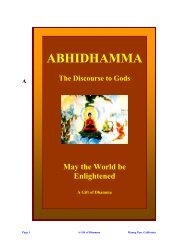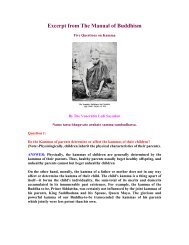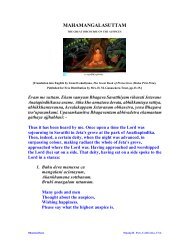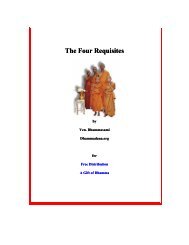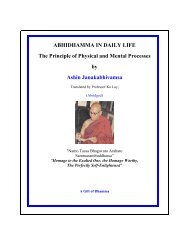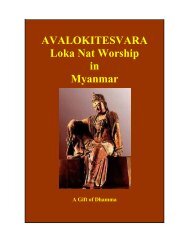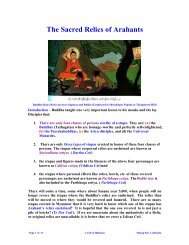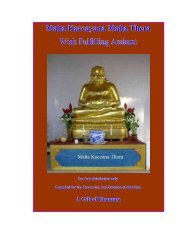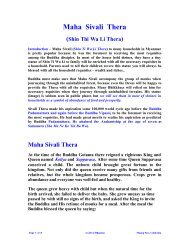Explanation Avija Sankhara-PATICCA ... - Usamyanmar.net
Explanation Avija Sankhara-PATICCA ... - Usamyanmar.net
Explanation Avija Sankhara-PATICCA ... - Usamyanmar.net
Create successful ePaper yourself
Turn your PDF publications into a flip-book with our unique Google optimized e-Paper software.
hearing the Buddha's discourse Migara attained Sotapatti Fruition. He felt very<br />
thankful to the Buddha and also to his daughter-in-law. Being so thankful, he<br />
declared that henceforth Visakha would be like a mother to him, and Visakha came<br />
to be known as Migaramata.<br />
Visakha gave birth to ten sons and ten daughters, and ten sons and ten daughters<br />
each were born to every one of her children and grand-children. Visakha possessed<br />
an immensely valuable gem-encrusted cloak given by her father as a wedding<br />
present. One day, Visakha went to the Jetavana monastery with her entourage. On<br />
arrival at the monastery, she found that her bejeweled cloak was too heavy. So, she<br />
took it off, wrapped it up in her shawl, and gave it to the maid to hold it and take<br />
care of it. The maid absentmindedly left it at the monastery. It was the custom for<br />
the Venerable Ananda to look after the things left by any one of the lay disciples.<br />
Visakha sent the maid back to the monastery saying, "Go and look for the<br />
bejeweled cloak, but if the Venerable Ananda had already found it and kept it in a<br />
place do not bring it back; I donate the bejeweled clock to the Venerable Ananda."<br />
But the Venerable Ananda did not accept her donation. So Visakha decided to sell<br />
the bejeweled cloak and donate the sale proceeds. But there was no one who could<br />
afford to buy that bejeweled cloak. So Visakha bought it back for nine crores and<br />
one lakh. With this money, she built a monastery on the eastern side of the city; this<br />
monastery came to be known as Pubbarama.<br />
After the libation ceremony she called all her family to her and on that night she<br />
told them that all her wishes had ken fulfilled and that she had nothing more to<br />
desire. Then reciting five verses of exultation she went round and round the<br />
monastery. Some bhikkhus hearing her, thought she was singing and reported to the<br />
Buddha that Visakha was not like before, and that she was going round and round<br />
the monastery, singing. "Could it be that she had gone off her head?" they asked the<br />
Buddha. To this question, the Buddha replied, "Today, Visakha had all her wishes<br />
of the past and present existences fulfilled and on account of that sense of<br />
achievement, she was feeling elated and contented; Visakha was just reciting some<br />
verses of exultation; she certainly had not gone off her head. Visakha, throughout<br />
her previous existences, had always been a generous donor and an ardent promoter<br />
of the Doctrine of successive Buddhas. She was most strongly inclined to do good<br />
deeds and had done much good in her previous existences, just as an expert florist<br />
makes many garlands from a collection of flowers.<br />
Then the Buddha spoke in verse as follows:<br />
Verse 53. As from a collection of flowers many a garland can be made by an expert<br />
florist, so also, much good can be done (with wealth, out of faith and generosity) by<br />
one subject to birth and death.<br />
Lesson 1. – One must work hard to accrue as much good merits as possible in this<br />
existence, so you can continue to enjoy good living in some future lives; in addition<br />
knowing that every good action leads to good result (kamma), we must accrue good



